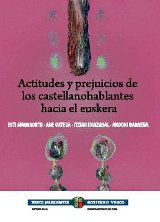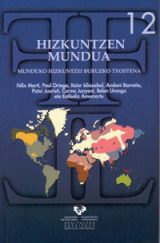Carried out projects
Linguistic Diversity Reflection Project in Arratia's secondary schoo
The agreement signed together with Azkue Foundation in 2020 allowed this project to be carried out throughout 2020.
(Due to COVID19 it was not possible to carry out all the planned dynamics)
Feeding Wikipedia in Basque with information about minority languages
The agreement signed together with Azkue Foundation in 2020 allowed this project to be carried out throughout 2020.
These are the 10 languages created or edited in the Wikipedia in Basque: Wolof, Quechua, Nasa yuwe, Emberera, Shipibo-conivo, Bariba, Tseltal, sign language, Amazigh and Tongan.
Institutionalisation of Intercultural Bilingual Education at the Public University of Guatemala
Invited by the Public University of Guatemala, the San Carlos University of Guatemala (USAC), the NGOD Mugen Gainetik and the Rigoberta Menchu Temuc Foundation, Andoni Barreña carried out an on-site evaluation of the implementation of Intercultural Bilingual Education programmes between 25 October and 10 November 2013, in different university institutions located in different Guatemalan regions.
Windows to the languages of the world
In this project, born out of the collaboration agreement signed with the Azkue Foundation (www.azkuefundazioa.org) on 29 March 2010, different Internet resources were used to provide accurate and accessible information on certain minority languages on the Foundation's website.
Foreign children learning Basque
Foreign children in schools in the Basque Country learn the local languages. Learning Eukera may be difficult in some environments, but in others, they learn Basque in the same way as Spanish-speaking children.
Cultural and linguistic diversity among the foreigners in the Basque Country: new challanges
Together with UNESCO Etxea and Ikuspegi, and with the support of the Department of Culture of the Basque Government, research was carried out on how the cultural and linguistic diversity brought by immigrants is experienced and manifested in the Basque Country.
Standardisation of the writing system of the Embera language and its schooling in Colombia.
Embera is a minority language spoken in and around Colombia. A group of Embera speakers, through the FUCLA University in the Chocó region of Colombia, asked the Chair for help in unifying the writing process, training and preparing resources to enable schooling in this language. A programme was designed with a grant from the AECID and the Department of Culture of the Basque Government, and the research began in 2010 and ended in 2012.
Attitudes and prejudices of Spanish speakers towards the Basque language

As a result of the agreement signed between UNESCO Etxea and the Vice-Ministry of Language Policy of the Basque Government (2006 - 2008), the project on linguistic attitudes towards the Basque language in the Basque Country ‘Euskarari buruzko Jarrerak’ was carried out, a project in which the Chair was also a collaborating party. This project ended in March 2009 with the publication of a highly topical and original report in Basque and Spanish:
-
Amorrortu, E.; Ortega, A.; Idiazabal, I.; Barreña, A. (2009). Prejuicios y actitudes de los castellanohablantes hacia el euskera. Bilbao: Eusko Jaurlaritza/Gobierno Vasco.
Documents:
Languages and Immigration ("Lenguas e Inmigración")
The Culture Department of the Basque Government and the "Hizkuntzen AMARAUNA" Technical Committee of UNESCO ETXEA organized the international seminar called "Lenguas e Inmigración". As an answer to the voices denouncing the loss of linguistic variety, the goal of the seminar was to get to know the new multilingual settings that are developing in the Basque Country. In that sense, we want to reinforce the adaptation of the immigrants by bringing them closer to the Basque language, and by encouraging them to learn this language while they keep their mother tongue. At the same time, some measures were proposed to manage the language diversity of the Basque Country, through the analysis of the experiences in the communities with minimized languages.
During 2007, IKUSPEGI and UNESCO ETXEA carried out a research on the languages that are spoken in the Basque Country due to immigration. The results were shown in the congress celebrated in Bilbao in the 23rd of may of 2008.
- Uranga, B.; Aierdi, X.; Idiazabal, I.; Barreña, A.; Amorrortu, E.; Ortega, A. (2008). Hizkuntzak eta immigrazioa. Lenguas e inmigración. Bilbao: IKUSPEGI, Amarauna UNESCO Etxea, Cátedra UNESCO Patrimonio Lingüístico. ISBN: 978-84-9860-086-5.
Languages of America
Another iniciative that was carried out with help from the Department of Culture and granted by the Department of Housing and Social Affairs of the Basque Government, thanks to which the following work was published:
- Uranga, B; Barreña, A.; Idiazabal, I.; Amorrortu, E.; Ortega, A.; Izagirre, E.(2007). Amerikako hizkuntza aniztasuna. Mexikotik Hego Konoraino - La diversidad lingüística en América. De México al Cono Sur. Donostia: Erein ISBN: 978-84-9746-410-9.
Words and Worlds:World Languages Review ("Palabras y Mundos: Informe sobre las lenguas del mundo")

It was born in the LINGUAPAX International Seminar about the Language Policies that was held in Leioa in 1996. In this seminar, former UNESCO Chairman Federico Mayor Zaragoza suggested making a research on the situation of the world languages. Precisely, Mr. Mayor Zaragoza stated the following:
There is a need for a first UNESCO review on the situation of the world languages that will describe the language richness of the planet, and that will explain the problems that languages around the world are facing, in order to promote the awareness of language heritage, to cooperate in the observation of the development of the languages and to recommend updated measures to protect languages still in use.
The project, called World Languages Review, was approved during the UNESCO General Assembly in 1997, and was funded by the Basque Country, after the Agreement- Memorandum that was signed the 23rd of July of 2007 by the Basque Government and UNESCO.
